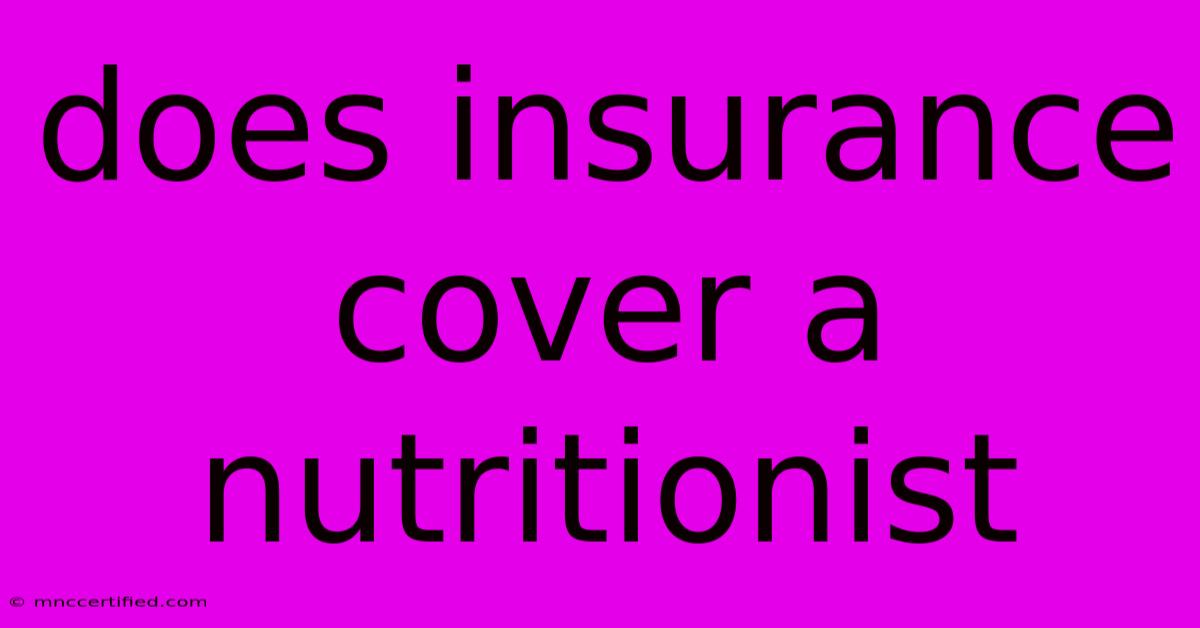Does Insurance Cover A Nutritionist

Table of Contents
Does Insurance Cover a Nutritionist? Navigating the Confusing World of Coverage
Seeking guidance from a nutritionist can be a valuable step towards improving your health and well-being. However, the cost of these consultations can quickly add up. A common question arises: Does my insurance cover a nutritionist? The answer, unfortunately, isn't straightforward.
The Complexities of Insurance Coverage
The landscape of insurance coverage for nutritionists is incredibly diverse and depends on several factors, including:
- Your insurance plan: Different insurance providers have varying policies regarding nutritionist coverage. Some may cover consultations, while others may not.
- Your specific needs: The reason you need a nutritionist can influence coverage. Some plans may only cover visits for weight management or diabetes, while others may cover broader nutritional counseling.
- Your location: State regulations and policies can impact insurance coverage for nutritionists.
- The nutritionist's credentials: Insurance companies may only cover consultations with registered dietitians (RDs) or licensed dietitians (LDs), who have specific educational qualifications and licensing.
How to Determine Coverage
To understand your specific coverage, you need to contact your insurance provider directly. Here's how to go about it:
- Contact your insurance company: Call or visit the insurance company's website to inquire about nutritionist coverage under your plan.
- Ask about specific details: Inquire about coverage for:
- Types of nutritionists covered: Do they cover RDs, LDs, or other professionals?
- Specific conditions: What conditions does your plan cover for nutrition consultations?
- Pre-authorization: Do you need pre-authorization for nutritionist visits?
- Review your Explanation of Benefits (EOB): If you have already seen a nutritionist, carefully examine your EOB to see if the visit was covered.
Alternatives to Insurance Coverage
If your insurance doesn't cover nutritionist visits, don't despair! There are alternative options:
- Out-of-pocket payment: You can pay for consultations out of pocket.
- Health Savings Accounts (HSAs) and Flexible Spending Accounts (FSAs): These accounts can be used for qualified medical expenses, including nutritionist visits.
- Negotiate payment plans: Some nutritionists offer payment plans or sliding scale fees.
- Look for free resources: Many libraries, community centers, and online platforms offer free nutritional information and resources.
The Importance of Seeking Qualified Professionals
It's vital to remember that not all nutrition professionals are created equal. When seeking help, make sure you are working with a registered dietitian (RD) or licensed dietitian (LD). They have undergone rigorous training and education, ensuring you receive credible and evidence-based advice.
In Conclusion:
Understanding your insurance coverage for nutritionists can be a daunting task. By contacting your insurance provider directly and exploring alternative options, you can make informed decisions regarding your nutritional health. Remember, investing in your well-being is always a worthwhile endeavor, even if it requires a little extra effort to navigate insurance complexities.

Thank you for visiting our website wich cover about Does Insurance Cover A Nutritionist. We hope the information provided has been useful to you. Feel free to contact us if you have any questions or need further assistance. See you next time and dont miss to bookmark.
Featured Posts
-
Celtics Begin Nba Cup Run Against Hawks
Nov 13, 2024
-
Butter Recall Undeclared Allergen In Costco Product
Nov 13, 2024
-
Valiant Newsletter Prepare For Home And Away
Nov 13, 2024
-
Live Score Kentucky Vs Duke Champions
Nov 13, 2024
-
Wrexham Wins Efl Trophy Tie Loses Shootout
Nov 13, 2024